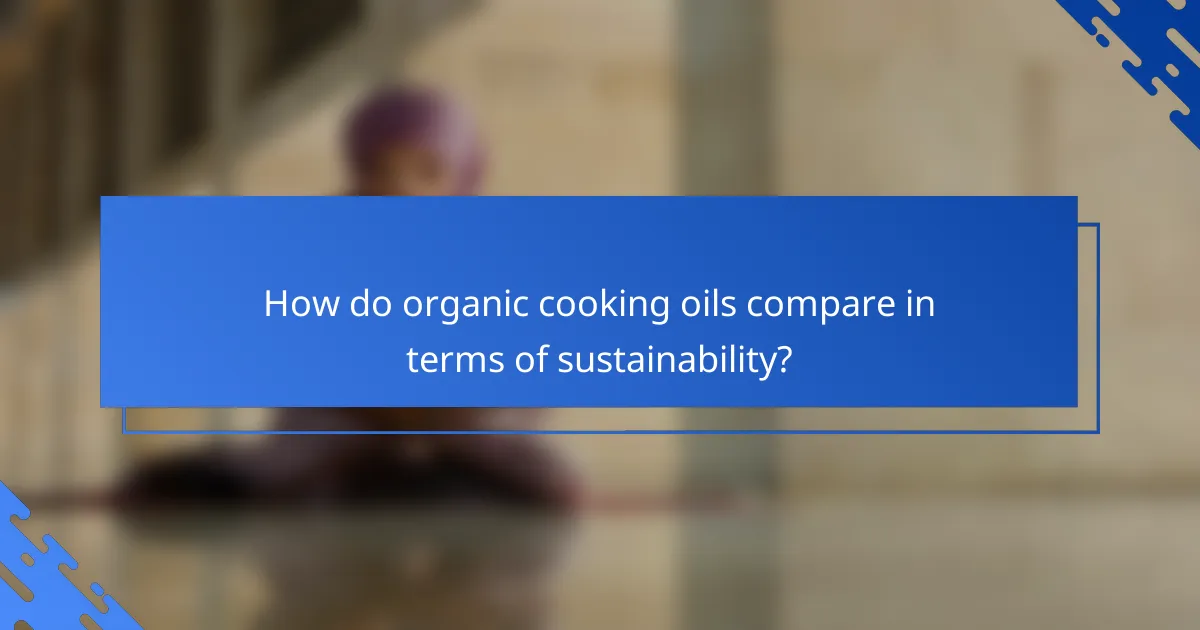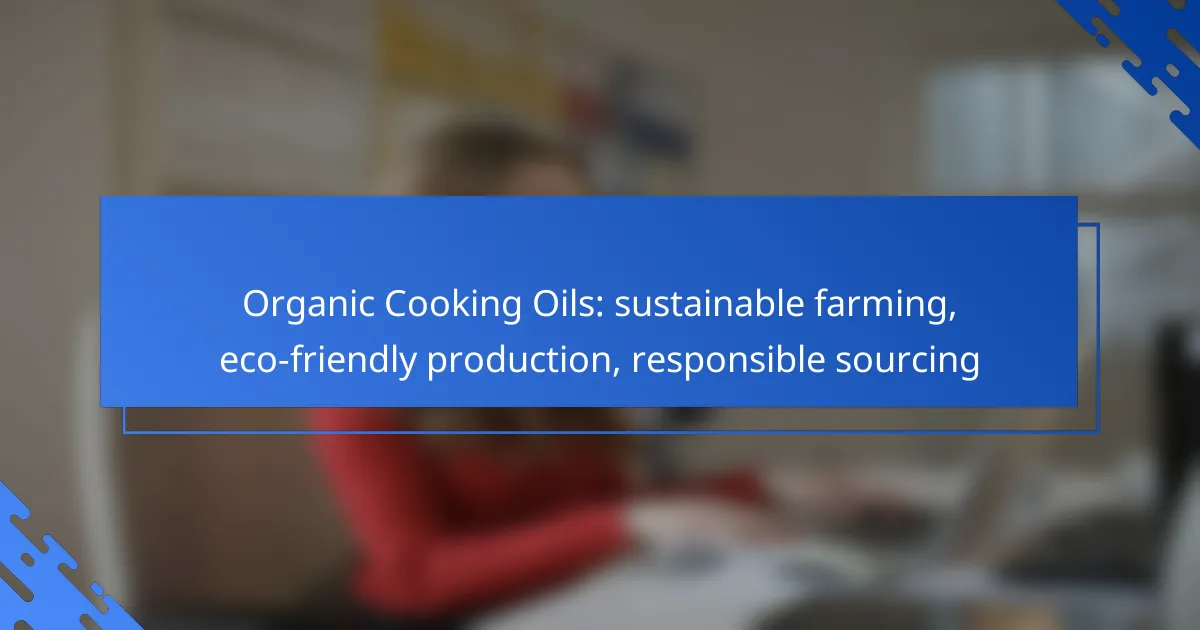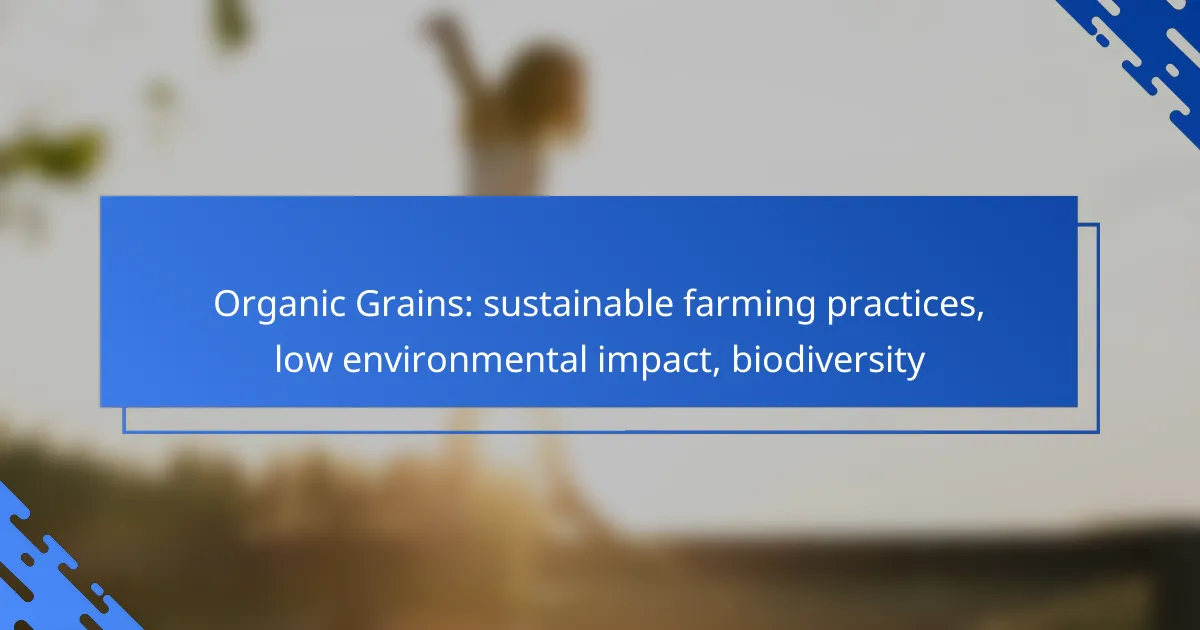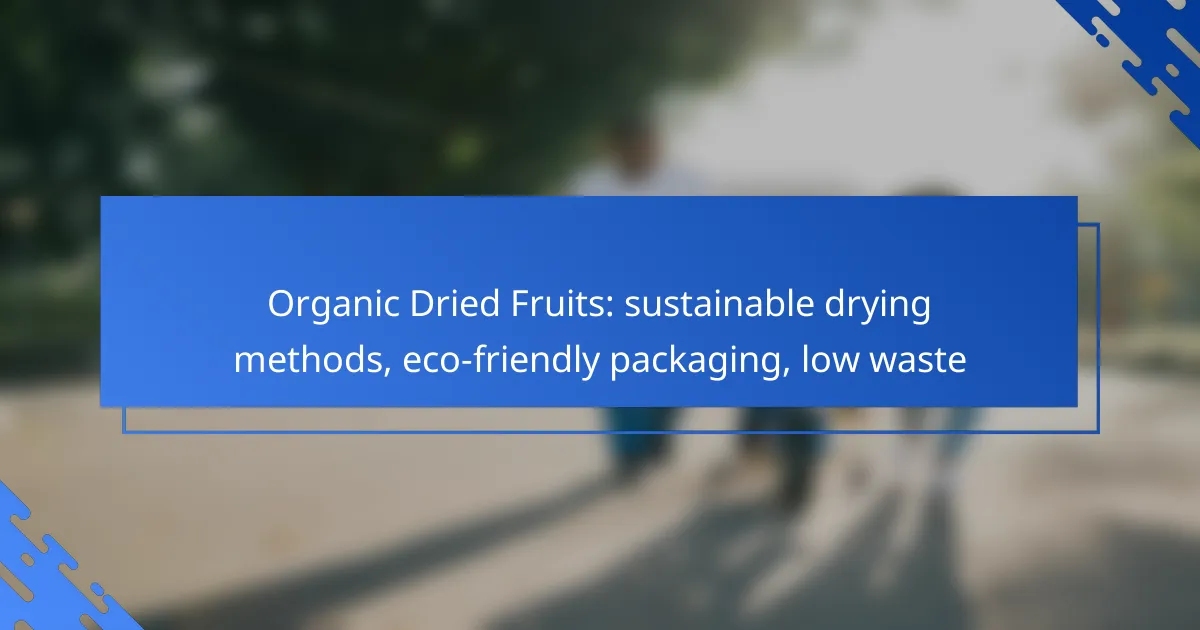Organic cooking oils represent a commitment to sustainable cooking by emphasizing eco-friendly production and responsible sourcing. By choosing these oils, consumers not only enhance their culinary creations but also support sustainable farming practices that prioritize environmental health and ethical agricultural methods.

What are the best organic cooking oils for sustainable cooking?
The best organic cooking oils for sustainable cooking include options that prioritize eco-friendly production, responsible sourcing, and sustainable farming practices. These oils not only enhance flavor but also support environmental health and ethical agricultural methods.
Extra Virgin Olive Oil
Extra virgin olive oil (EVOO) is renowned for its rich flavor and health benefits. Sourced from the first pressing of olives, it is often produced using sustainable farming techniques that minimize environmental impact. Look for oils certified by organizations like the International Olive Council to ensure quality and sustainability.
When purchasing EVOO, consider the origin; oils from Mediterranean countries like Italy and Spain often adhere to stricter quality standards. Aim for oils that are cold-pressed and stored in dark glass bottles to preserve their integrity.
Coconut Oil
Coconut oil is a versatile cooking oil that is popular for its high smoke point and unique flavor. Sustainable coconut oil is typically sourced from small-scale farmers who practice organic farming methods, ensuring minimal environmental harm. Certifications like Fair Trade can also indicate responsible sourcing.
When selecting coconut oil, opt for virgin varieties, which retain more nutrients and flavor. Be mindful of the sourcing; oils from regions like the Philippines or Sri Lanka often have better sustainability practices compared to mass-produced alternatives.
Avocado Oil
Avocado oil is gaining popularity for its high smoke point and healthy fats. It is often produced from avocados grown on sustainable farms that prioritize eco-friendly practices. Look for organic certifications to ensure that the oil is free from harmful pesticides and chemicals.
When using avocado oil, consider its versatility in cooking methods, from frying to salad dressings. Choose oils that are cold-pressed to retain the most nutrients and flavor, and check for local sourcing options to support regional agriculture.
Flaxseed Oil
Flaxseed oil is rich in omega-3 fatty acids and is often used in salad dressings or as a supplement. It is typically produced from organically grown flaxseeds, making it a sustainable choice. Ensure that the oil is cold-pressed and stored in dark containers to maintain freshness.
Due to its low smoke point, flaxseed oil is not suitable for cooking at high temperatures. Instead, use it in cold dishes or as a finishing oil. Look for oils that are certified organic to ensure responsible farming practices.
Sunflower Oil
Sunflower oil is commonly used for frying and baking due to its light flavor and high smoke point. Opt for organic sunflower oil, which is produced from sunflowers grown without synthetic pesticides or fertilizers. This helps promote sustainable farming practices.
When choosing sunflower oil, consider the type; high-oleic sunflower oil is a healthier option due to its higher monounsaturated fat content. Check for certifications that indicate responsible sourcing and production methods to ensure you’re making an eco-friendly choice.

How are organic cooking oils produced sustainably?
Organic cooking oils are produced sustainably through practices that prioritize environmental health, responsible sourcing, and eco-friendly production methods. These practices include using natural farming techniques, minimizing chemical inputs, and ensuring that the entire production process has a low ecological footprint.
Eco-friendly extraction methods
Eco-friendly extraction methods focus on minimizing environmental impact while maximizing oil quality. Techniques such as solvent-free extraction and mechanical pressing reduce the use of harmful chemicals and energy consumption. These methods often result in oils that retain more nutrients and flavor, appealing to health-conscious consumers.
Producers may also implement closed-loop systems that recycle solvents and reduce waste, further enhancing sustainability. Choosing oils extracted through these methods can support both health and environmental goals.
Cold-pressed techniques
Cold-pressed techniques are a popular choice for producing organic cooking oils, as they involve extracting oil without applying heat. This method preserves the natural flavors, aromas, and nutrients of the oil, making it a preferred option for culinary uses. Cold-pressed oils are typically richer in antioxidants and essential fatty acids compared to those extracted using heat.
When selecting cold-pressed oils, look for certifications that guarantee organic and sustainable practices. These oils often come with a higher price tag, but their quality and health benefits can justify the cost.
Renewable energy usage
Renewable energy usage in the production of organic cooking oils significantly reduces the carbon footprint associated with oil extraction and processing. Many producers are adopting solar, wind, or biomass energy sources to power their operations, which not only lowers greenhouse gas emissions but also promotes energy independence.
When evaluating brands, consider those that openly share their energy practices and sustainability initiatives. Supporting companies that invest in renewable energy can help drive the market toward more sustainable practices in the food industry.

What are the benefits of using responsibly sourced cooking oils?
Using responsibly sourced cooking oils offers numerous advantages, including improved health, reduced environmental impact, and support for local farming communities. These oils are produced through sustainable practices that prioritize ecological balance and social responsibility.
Health benefits
Responsibly sourced cooking oils often retain higher nutritional value compared to conventional options. For instance, oils like extra virgin olive oil and avocado oil are rich in healthy fats and antioxidants, which can promote heart health and reduce inflammation.
When selecting cooking oils, look for those that are cold-pressed or minimally processed, as these methods preserve beneficial compounds. Avoid oils that contain [censured] fats or excessive additives, which can negate health benefits.
Environmental impact
Choosing eco-friendly cooking oils helps reduce the carbon footprint associated with food production. Sustainable farming practices, such as crop rotation and organic cultivation, minimize pesticide use and promote biodiversity.
Additionally, responsibly sourced oils often come from farms that prioritize soil health and water conservation. This not only protects local ecosystems but also contributes to long-term agricultural sustainability.
Support for local farmers
Purchasing responsibly sourced cooking oils often means supporting local farmers who engage in ethical farming practices. This direct support helps strengthen local economies and encourages sustainable agricultural methods.
Look for certifications such as Fair Trade or organic labels, which indicate that farmers receive fair compensation for their products. By choosing these oils, consumers can contribute to a more equitable food system while enjoying high-quality cooking ingredients.

How to choose organic cooking oils for eco-friendly cooking?
Choosing organic cooking oils for eco-friendly cooking involves selecting products that prioritize sustainable farming, eco-friendly production methods, and responsible sourcing. Look for oils that meet recognized organic standards and are produced with minimal environmental impact.
Look for certifications
Certifications are crucial indicators of the organic quality and sustainability of cooking oils. Look for labels such as USDA Organic, which ensures that the oil is produced without synthetic fertilizers or pesticides, and Non-GMO Project Verified, indicating that the oil is free from genetically modified organisms.
Additionally, consider certifications like Fair Trade, which support ethical labor practices, and Rainforest Alliance, which promotes biodiversity and sustainable farming. These certifications help ensure that your cooking oil aligns with eco-friendly values.
Check sourcing transparency
Sourcing transparency is essential for understanding the origins of your cooking oil. Research brands that provide detailed information about where their ingredients come from and how they are produced. This can often be found on the company’s website or product packaging.
Look for oils sourced from local or regional farms, as this can reduce transportation emissions and support local economies. Brands that openly share their sourcing practices are more likely to prioritize sustainability and responsible farming methods.
Evaluate packaging sustainability
The sustainability of packaging plays a significant role in the overall eco-friendliness of cooking oils. Choose oils that come in recyclable or biodegradable containers, as this reduces waste and environmental impact. Glass bottles are often preferable to plastic, as they are more easily recycled and do not leach chemicals.
Additionally, consider bulk purchasing options to minimize packaging waste. Some stores offer refill stations for cooking oils, allowing you to bring your own container and reduce single-use packaging.

What are the key attributes of high-quality organic cooking oils?
High-quality organic cooking oils are characterized by their production methods, flavor, and thermal stability. These oils are derived from sustainably farmed crops, ensuring eco-friendly practices and responsible sourcing.
Cold-pressed quality
Cold-pressed oils are extracted without the use of heat, preserving their natural flavors and nutrients. This method typically results in a higher quality oil that retains essential fatty acids and antioxidants, making it a healthier choice for cooking and dressing.
When selecting cold-pressed oils, look for labels indicating the extraction method. Oils such as extra virgin olive oil and cold-pressed avocado oil are popular examples that offer both flavor and health benefits.
Flavor profiles
The flavor of organic cooking oils can vary significantly depending on the source. For instance, olive oil has a fruity, peppery taste, while sesame oil offers a nutty flavor, making each suitable for different culinary applications.
Choosing the right oil for your dish can enhance the overall taste. Experiment with oils like coconut for baking or grapeseed for sautéing to find the best match for your recipes.
Smoke points
Smoke point refers to the temperature at which an oil begins to smoke and break down, affecting both flavor and nutritional value. High-quality organic oils typically have varying smoke points, which should be considered when cooking.
For example, olive oil has a smoke point around 190-220°C (375-428°F), making it suitable for medium-heat cooking, while oils like avocado can withstand higher temperatures, reaching up to 270°C (520°F). Always check smoke points to avoid burning your oil and compromising your dish.

How do organic cooking oils compare in terms of sustainability?
Organic cooking oils are generally more sustainable than conventional options due to their production methods, which emphasize eco-friendly practices and responsible sourcing. These oils often come from farms that prioritize soil health, biodiversity, and reduced chemical usage, contributing to a healthier environment.
Sustainable farming practices
Sustainable farming practices in organic cooking oil production include crop rotation, cover cropping, and the use of natural fertilizers. These methods enhance soil fertility and reduce erosion, promoting long-term agricultural health. Additionally, organic farms often maintain biodiversity by avoiding monoculture, which helps protect local ecosystems.
Eco-friendly production methods for organic cooking oils focus on minimizing environmental impact. This includes using renewable energy sources, reducing water consumption, and implementing waste management strategies. For example, some producers utilize cold-press extraction techniques that preserve nutrients while avoiding harmful solvents.
Responsible sourcing
Responsible sourcing of organic cooking oils involves ensuring that ingredients are obtained from suppliers who adhere to organic standards and ethical practices. This can include fair trade certifications and transparency in supply chains. Consumers should look for labels that indicate compliance with recognized organic standards to support sustainable sourcing.










